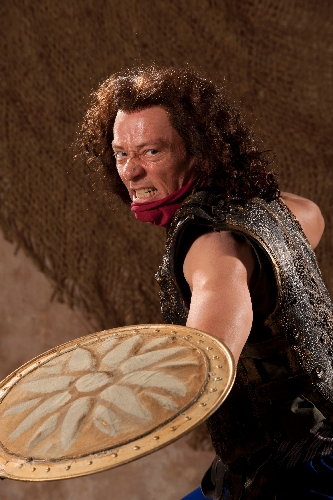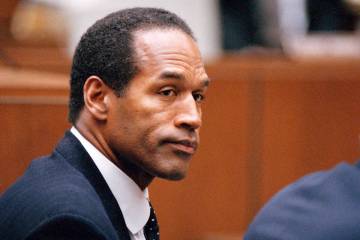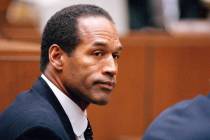Utah Shakespearean Festival fall season lineup takes theatergoers through time, territory
From Las Vegas, it's a quick trip to the Utah Shakespearean Festival in Cedar City. (A 2½-hour drive north on Interstate 15, to be specific.)
Once there, however, theatergoers can travel across time, and territory, without ever leaving their seats at the Randall L. Jones Theatre.
During the festival's six-week fall season, which began Thursday, a perilous odyssey inspires Shakespeare's seldom-seen "The Adventures of Pericles," while "The Diary of Anne Frank" revisits the harrowing, yet inspirational tale of humanity in the face of inhumanity. And two actors portray a wide range of Texas townsfolk livin' large in "Greater Tuna."
The three plays -- one adventurous, one sobering, one satirical -- signal the possibility of a turnaround in the festival's financial fortunes, suggests executive director R. Scott Phillips.
After all, Shakespeare's rarely produced "Pericles" was scheduled for staging last fall -- until the economic downturn prompted its postponement. Festival officials also reduced the size of the fall 2009 acting company to five players.
This year, 14 performers will appear during the three-play fall season, Phillips says. (By contrast, 63 actors appeared in the summer's six presentations.)
"We're edging our way back to a larger company," he notes.
But not larger than necessary.
After all, this season's "Pericles" features "only 12 actors, not 21," Phillips says. "We wanted to do a production that could be conceptualized."
This "Pericles" also takes advantage of "how our theatrical tools have grown," according to director Kathleen Conlin. "We're using as much of the technology as we can," from props to projections, to suggest the title character's voyages.
"For the longest time in scholarly circles, people shied away" from "Pericles" and other "unusual" Shakespeare plays, Conlin notes, "but that has all changed in the last couple of decades."
In part, she suggests, that's because "the influence of film, and adventure film in particular, has allowed audiences to understand quick changes of pace" -- and place.
That comes in particularly handy when depicting the adventures of "Pericles' " seafaring title character (played by Tim Casto ), who sets sail in search of "fortune and glory" (as Indiana Jones himself might say), only to discover even more valuable treasure within.
"As usual," Conlin says, "Shakespeare was about 400 years ahead of his time."
In contrast to Pericles' wide-ranging voyages, "The Diary of Anne Frank" confines audiences to a hidden annex in 1942 Amsterdam, where two Jewish families -- including the teenage Anne (Mariko Nakasone ) -- take refuge from Nazi persecution.
"The Diary of Anne Frank" has been a theatrical staple since it debuted the 1950s, but "this is a different take" on the Pulitzer Prize-winning original, explains director James Edmondson .
Anne Frank's father, Otto Frank, influenced Frances Goodrich and Albert Hackett's initial dramatization by downplaying certain aspects -- including Anne's conflicts with her mother -- "in an effort to make it more universal," Edmondson says. "The best way now to make it more universal was to be more specific."
Staging Wendy Kesselman's revised "Anne Frank" adaptation this fall presents an opportunity to get schools involved with the festival, Phillips points out.
In addition, the play addresses similar themes of tolerance and forgiveness explored in the festival's summer production of Shakespeare's "The Merchant of Venice," he adds. "We're continuing to look at what has transpired -- or has not transpired -- in 450 years."
Overall, "it's a reminder of what we're capable of -- in a noble way and in a destructive way," Edmondson says of Anne Frank's story. "I don't know if it's a great play, but it's an important play," one "every generation of people should see."
And while there's no denying the story's more harrowing aspects, the director acknowledges, "The Diary of Anne Frank" also has "joyousness at times, and the bravery of the people, to keep it from being overwhelming."
Even so, there's no denying the comedy relief role "Greater Tuna" plays in this fall's lineup, admits director Brian Vaughn -- who, as of Jan. 1, officially becomes the festival's co-artistic director along with friend and fellow festival favorite David Ivers.
"Luckily, the play is kind of an old warhorse," Vaughn says of "Greater Tuna," citing its track record of generating laughter by spoofing the manners and morals of Texas' third-smallest town.
Actors Michael Daly and George Walker "play 20 characters, 10 each -- both genders, all ages, and even a dog at one point," Vaughn says of the show's quick-change tour de farce.
Playwrights Jaston Williams, Joe Sears and Ed Howard created "Greater Tuna" as a party skit, based on a political cartoon, more than two decades ago.
And the combination of political commentary on top of broad comedy accounts, in part, for the show's continuing popularity, Vaughn comments. (Las Vegas Little Theatre's current production, for example, continues through Sept. 26.)
Besides, Phillips adds, "Greater Tuna" could be any small town.
"It could be Pahrump," he says. "It could be Logandale."
It might even be Cedar City.
Yet for all its small-town ways, Cedar City also remains a place where artists at the Utah Shakespearean Festival, on stage and off, are encouraged to "go as far as we can -- and be creative and risky in all the good ways," says Conlin. "Imagination is what wins out, time and time again."
Contact reporter Carol Cling at ccling@reviewjournal.com or 702-383-0272.
Preview
Utah Shakespearean Festival
2 and 7:30 p.m. Tuesdays-Saturdays, through Oct. 23
Randall L. Jones Theatre, Cedar City
$25-$59; (800) 752-9849, www.bard.org




























